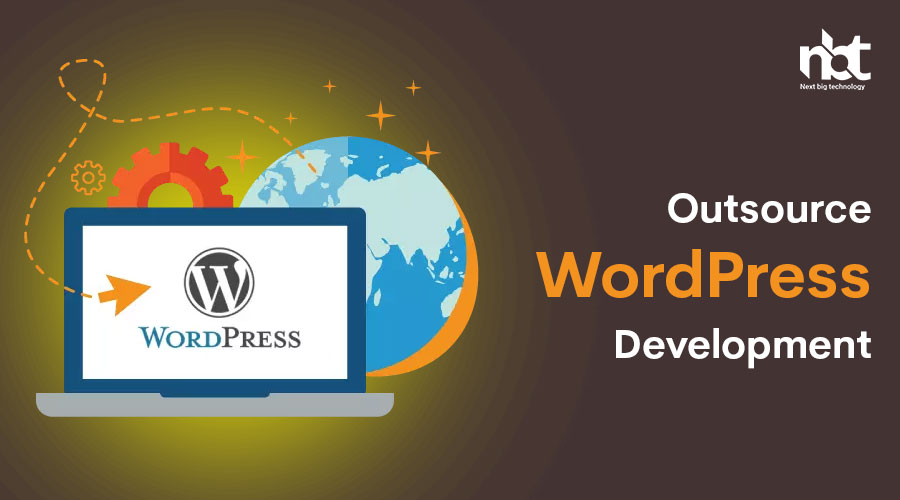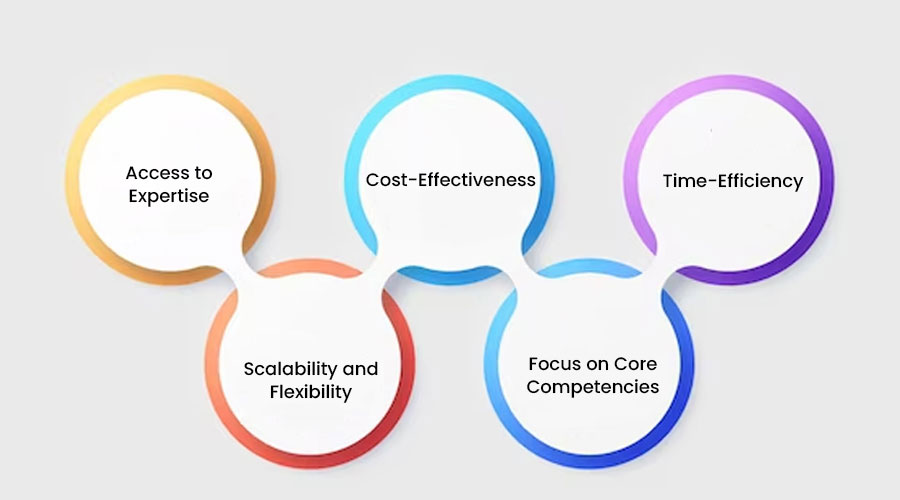Table of Contents
Understanding the Need for Outsourcing WordPress Development
In today’s digital era, having a strong online presence is imperative for businesses aiming to thrive in the competitive market landscape. As one of the most popular content management systems (CMS) globally, WordPress offers a myriad of features and functionalities that empower businesses to create and manage their websites efficiently. However, harnessing the full potential of WordPress often requires specialized expertise and dedicated resources, which may not be readily available within every organization. This is where outsourcing WordPress development comes into play.
Understanding the need for outsourcing WordPress development entails recognizing the challenges and opportunities associated with website management and optimization. Here’s a closer look at why businesses are increasingly turning to outsourcing for their WordPress needs:
- Access to Expertise: Outsourcing WordPress development enables businesses to tap into a pool of skilled professionals with specialized knowledge and experience in WordPress development. These experts possess a deep understanding of the platform’s architecture, coding standards, and best practices, ensuring the development of high-quality, robust, and scalable websites.
- Cost Efficiency: Building an in-house team of WordPress developers can be a costly endeavor, involving recruitment expenses, salaries, benefits, and overhead costs. Outsourcing WordPress development allows businesses to access top-tier talent without the financial burden associated with maintaining a full-time team. Moreover, outsourcing partners often operate from regions with lower labor costs, offering competitive pricing without compromising quality.
- Focus on Core Competencies: By outsourcing WordPress development, businesses can redirect their internal resources and focus on core competencies essential for driving growth and innovation. Instead of allocating time and effort to managing website development tasks, internal teams can concentrate on strategic initiatives, customer engagement, and product development, thereby enhancing overall operational efficiency.
- Flexibility and Scalability: Outsourcing WordPress development offers unparalleled flexibility and scalability, allowing businesses to adapt to changing market dynamics and project requirements seamlessly. Whether it’s a small website redesign or a complex e-commerce platform development, outsourcing partners can scale their resources up or down according to the project’s scope and timeline, ensuring timely delivery without compromising quality.
- Time Savings: In today’s fast-paced business environment, time is of the essence. Outsourcing WordPress development accelerates the website development process by leveraging the expertise of experienced professionals who can efficiently execute tasks within stipulated timelines. This not only reduces time-to-market but also enables businesses to stay ahead of competitors and capitalize on emerging opportunities.
- Continuous Support and Maintenance: Beyond website development, outsourcing partners often provide ongoing support and maintenance services, ensuring that the WordPress site remains secure, up-to-date, and optimized for performance. From regular updates and security patches to troubleshooting and technical assistance, outsourcing partners offer comprehensive support, allowing businesses to focus on their core objectives with peace of mind.
Advantages of Outsourcing WordPress Development Projects
In today’s digital landscape, having a robust online presence is paramount for businesses to thrive. WordPress, with its user-friendly interface and extensive customization options, has emerged as a go-to platform for building websites. However, crafting a polished WordPress site requires technical expertise and time investment, which may not always align with a company’s resources. This is where outsourcing WordPress development projects comes into play, offering a myriad of advantages that can propel businesses towards success.
- Cost Efficiency: Outsourcing WordPress development projects can significantly reduce costs compared to hiring an in-house team. By tapping into the global talent pool, businesses can find skilled professionals at competitive rates. Additionally, outsourcing eliminates overhead expenses such as office space, equipment, and employee benefits, allowing companies to allocate their resources more efficiently.
- Access to Specialized Skills: WordPress development encompasses various disciplines, including web design, coding, SEO, and content creation. Outsourcing allows businesses to collaborate with experts in each field, ensuring that every aspect of their website is handled with precision. Whether it’s implementing complex functionalities or optimizing the site for search engines, outsourcing provides access to specialized skills that may not be available internally.
- Faster Turnaround Times: Time is of the essence in the digital realm, where trends evolve rapidly, and competitors are constantly vying for attention. Outsourcing WordPress development projects to experienced professionals can expedite the process, thanks to their streamlined workflows and extensive industry knowledge. This enables businesses to launch their websites faster, seize opportunities, and stay ahead of the curve.
- Focus on Core Competencies: Outsourcing non-core activities like WordPress development allows businesses to focus on their core competencies. Instead of allocating valuable time and resources to tasks outside their expertise, companies can concentrate on innovation, customer service, and business growth. This strategic approach fosters efficiency and enables organizations to maximize their competitive advantage.
- Scalability and Flexibility: Outsourcing WordPress development provides scalability and flexibility, allowing businesses to adapt to fluctuating demands and market dynamics. Whether it’s a small website revamp or a large-scale project, outsourcing enables companies to scale their resources up or down as needed, without the constraints of hiring and managing additional staff internally.
- Risk Mitigation: Entrusting WordPress development to seasoned professionals reduces the risk of errors and technical glitches. Outsourcing firms are well-versed in industry best practices and quality assurance protocols, ensuring that projects are executed smoothly and deliver optimal results. Moreover, reputable outsourcing partners often offer service level agreements (SLAs) and warranties, providing added assurance and peace of mind to clients.
- 24/7 Support and Maintenance: Building a WordPress website is just the first step; ongoing support and maintenance are crucial for its long-term success. Many outsourcing firms offer round-the-clock support services, ensuring that websites remain secure, up-to-date, and fully functional at all times. This proactive approach minimizes downtime, enhances user experience, and safeguards against potential threats or vulnerabilities.
Choosing the Right Outsourcing Partner for WordPress Development
In the dynamic landscape of online business, having a robust and visually appealing website is crucial for success. WordPress, with its user-friendly interface and extensive customization options, has become the go-to platform for millions of businesses worldwide. However, not all businesses have the in-house expertise or resources to handle WordPress development efficiently. This is where outsourcing comes into play.
Outsourcing WordPress development can offer numerous benefits, including cost savings, access to specialized expertise, and faster project delivery. However, selecting the right outsourcing partner is paramount to ensuring the success of your WordPress project. Here are some essential factors to consider when choosing the perfect outsourcing partner for your WordPress development needs:
- Expertise and Experience: Look for outsourcing partners with a proven track record in WordPress development. Check their portfolio to assess the quality of their work and see if they have experience in projects similar to yours. A partner with extensive experience is more likely to understand your requirements and deliver high-quality results.
- Technical Proficiency: WordPress development requires a combination of technical skills, including proficiency in programming languages such as PHP, HTML, CSS, and JavaScript. Ensure that your outsourcing partner has a team of skilled developers who are well-versed in these technologies. Additionally, inquire about their experience with WordPress themes, plugins, and customization to gauge their technical capabilities.
- Communication and Collaboration: Effective communication is vital for the success of any outsourcing project. Choose a partner who can communicate clearly and promptly, understands your project requirements, and provides regular updates on the progress. A collaborative approach ensures that your ideas are understood and implemented effectively, leading to better outcomes.
- Quality Assurance and Testing: A reliable outsourcing partner should have robust quality assurance processes in place to ensure that the final deliverables meet the highest standards. Inquire about their testing methodologies, including manual and automated testing, to identify and fix any issues before deployment. Quality assurance is essential for ensuring a bug-free and seamless WordPress website.
- Scalability and Flexibility: Your outsourcing partner should be able to scale their team according to your project requirements and deadlines. Whether you need a small website or a complex web application, ensure that your partner has the flexibility to adapt to your needs. Scalability ensures that your project can grow as your business expands without compromising on quality or timelines.
- Reputation and Reviews: Research the reputation of potential outsourcing partners by reading reviews and testimonials from their past clients. Look for feedback regarding their reliability, professionalism, and ability to deliver results. A partner with a strong reputation is more likely to prioritize customer satisfaction and deliver on their promises.
- Cost and Budget: While cost is an important factor, it should not be the sole determining factor when choosing an outsourcing partner. Instead of opting for the cheapest option, focus on the value that the partner can deliver within your budget constraints. Consider factors such as quality, expertise, and reliability when evaluating the cost-effectiveness of different outsourcing options.
Key Considerations Before Outsourcing WordPress Projects
In the bustling world of web development, outsourcing has become a prevalent strategy for businesses looking to streamline their processes and tap into specialized expertise. When it comes to WordPress projects, outsourcing can offer numerous benefits, from cost savings to accelerated timelines. However, before taking the plunge, it’s crucial to carefully evaluate a few key considerations to ensure a successful outsourcing experience.
- Define Your Goals and Requirements: Before outsourcing any WordPress project, take the time to clearly define your objectives and requirements. Are you looking to revamp your website’s design, enhance its functionality, or optimize its performance? By establishing clear goals upfront, you can effectively communicate your expectations to potential outsourcing partners and ensure alignment from the outset.
- Evaluate Expertise and Experience: When selecting an outsourcing partner for your WordPress project, expertise and experience should be top priorities. Look for agencies or freelancers with a proven track record of delivering high-quality WordPress solutions. Consider factors such as the number of years in business, client testimonials, and portfolio of past projects to gauge their capabilities effectively.
- Assess Technical Proficiency: WordPress is a versatile platform with a wide range of customization options. Depending on the complexity of your project, you may require expertise in areas such as theme development, plugin integration, e-commerce functionality, or performance optimization. Evaluate the technical proficiency of potential outsourcing partners to ensure they possess the requisite skills to fulfill your requirements.
- Communication and Collaboration: Effective communication is essential for the success of any outsourcing endeavor. Look for partners who demonstrate clear and transparent communication channels, prompt responsiveness, and a collaborative approach to project management. Establishing regular check-ins, setting clear expectations, and providing feedback throughout the project lifecycle can help foster a productive working relationship.
- Consider Budget and Cost Structure: Outsourcing WordPress projects can offer significant cost savings compared to hiring in-house resources. However, it’s essential to consider your budget constraints and carefully evaluate the cost structures offered by potential outsourcing partners. Compare pricing models, such as hourly rates, fixed-price contracts, or retainer agreements, and ensure they align with your budgetary requirements.
- Quality Assurance and Support: A successful WordPress project extends beyond its initial development phase. Consider outsourcing partners who offer comprehensive quality assurance processes, including testing, debugging, and optimization to ensure a seamless end product. Additionally, inquire about post-launch support and maintenance services to address any issues or updates that may arise down the line.
- Security and Confidentiality: Protecting your website’s data and sensitive information should be a top priority when outsourcing WordPress projects. Ensure that potential partners adhere to strict security protocols, such as data encryption, secure development practices, and compliance with industry standards. Additionally, establish clear agreements regarding confidentiality and intellectual property rights to safeguard your interests.
By carefully considering these key factors before outsourcing your WordPress projects, you can mitigate risks, maximize value, and pave the way for a successful collaboration. Remember to conduct thorough research, ask pertinent questions, and choose a partner who not only meets your technical requirements but also aligns with your vision and values. With the right outsourcing strategy in place, you can unlock the full potential of your WordPress endeavors and achieve your business objectives with confidence.
Ensuring Quality Control in Outsourced WordPress Development
In today’s digital era, WordPress has emerged as a cornerstone platform for building websites. Its flexibility, scalability, and user-friendly interface make it a top choice for businesses and individuals alike. However, not everyone possesses the technical expertise or resources to develop a WordPress website in-house. This is where outsourced WordPress development comes into play.
Outsourcing WordPress development can be a game-changer for businesses looking to establish a strong online presence without the hassle of hiring an in-house team. However, ensuring quality control in outsourced WordPress development can pose a significant challenge. With different time zones, cultural differences, and communication barriers, maintaining the desired level of quality can become a daunting task. But fear not, as we delve into the strategies and best practices to ensure quality control in outsourced WordPress development.
- Define Clear Requirements: The foundation of quality control begins with clearly defining your requirements and expectations. Documenting detailed specifications, including design preferences, functionality requirements, and performance benchmarks, provides a roadmap for the outsourced team to follow. This clarity minimizes ambiguity and reduces the likelihood of misunderstandings during the development process.
- Choose the Right Partner: Selecting the right outsourcing partner is crucial for successful project delivery. Look for agencies or freelancers with a proven track record in WordPress development and a portfolio that aligns with your project requirements. Conduct thorough research, read client testimonials, and request references to gauge their expertise and reliability.
- Establish Effective Communication Channels: Effective communication is the cornerstone of quality control in outsourced WordPress development. Utilize project management tools, such as Slack, Trello, or Asana, to facilitate real-time communication and collaboration. Schedule regular status meetings and provide timely feedback to ensure alignment and address any issues promptly.
- Implement Quality Assurance Processes: Incorporate quality assurance processes throughout the development lifecycle to identify and rectify issues early on. Conduct thorough code reviews, perform functional testing, and ensure compatibility across different devices and browsers. Establishing a robust testing framework minimizes the risk of bugs and enhances the overall quality of the WordPress website.
- Monitor Progress Continuously: Stay actively involved in the development process by monitoring progress and milestones regularly. Leverage project management tools to track tasks, monitor deadlines, and assess progress against predefined benchmarks. Address any deviations from the project plan promptly to maintain momentum and prevent delays.
- Encourage Collaboration and Feedback: Foster a culture of collaboration and open communication between your internal team and the outsourced developers. Encourage sharing of ideas, provide constructive feedback, and incorporate suggestions for improvement. A collaborative approach fosters a sense of ownership and commitment, driving towards the common goal of delivering a high-quality WordPress website.
- Prioritize Security and Compliance: Ensure that security measures and compliance standards are upheld throughout the development process. Implement best practices for data protection, secure authentication, and compliance with relevant regulations, such as GDPR or HIPAA. Regular security audits and vulnerability assessments mitigate the risk of breaches and safeguard sensitive information.
- Invest in Ongoing Support and Maintenance: Quality control doesn’t end with the launch of the WordPress website; it extends to ongoing support and maintenance. Partner with a reliable maintenance provider to address any post-launch issues, perform updates, and implement security patches regularly. Investing in long-term support ensures the longevity and performance of your WordPress website.
Budgeting and Cost Factors in Outsourcing WordPress Development
In today’s digital age, having a robust online presence is non-negotiable for businesses striving to thrive in a competitive landscape. WordPress, with its user-friendly interface and customizable features, remains a top choice for creating websites. However, for many businesses, outsourcing WordPress development is a strategic move to ensure a professional and efficient outcome while managing costs effectively. Let’s delve into the intricacies of budgeting and the key cost factors associated with outsourcing WordPress development.
Understanding Budgeting in Outsourcing WordPress Development
Effective budgeting is essential for any outsourcing endeavor, including WordPress development. It involves meticulous planning and allocation of financial resources to ensure the project’s success without overspending. Here are some crucial steps to master budgeting in outsourcing WordPress development:
- Define Project Scope: Clearly outline your project requirements, including design preferences, functionalities, and timelines. A well-defined scope helps in estimating costs accurately and avoids scope creep, which can lead to budget overruns.
- Research Service Providers: Explore various outsourcing options, such as freelance developers, agencies, or offshore development teams. Assess their expertise, portfolio, and pricing models to find the right fit for your project.
- Set a Realistic Budget: Determine a budget that aligns with your project scope and business objectives. Consider factors like development hours, complexity of design, customization needs, and ongoing support requirements.
- Factor in Contingencies: Anticipate potential risks and unforeseen expenses by allocating a contingency budget. This buffer helps in handling any unexpected challenges or changes during the development process.
- Negotiate Terms and Contracts: Negotiate pricing, payment schedules, and contract terms with the chosen service provider to ensure transparency and mitigate financial risks.
Key Cost Factors in Outsourcing WordPress Development
While outsourcing WordPress development offers cost-efficiency compared to in-house development, several factors influence project costs. Understanding these cost factors is crucial for budget allocation and decision-making:
- Complexity of Design: The complexity of the website design significantly impacts development costs. Custom designs or intricate layouts may require more time and resources, leading to higher expenses.
- Functionality Requirements: Integrating specific functionalities, such as e-commerce features, membership portals, or third-party API integrations, adds to the development complexity and cost.
- Customization and Plugins: Customizing WordPress themes or developing bespoke plugins tailored to your business needs incurs additional expenses. Evaluate the necessity of each customization to avoid unnecessary costs.
- Development Hourly Rates: The hourly rates charged by developers vary based on their skill level, location, and experience. Offshore development teams often offer lower rates compared to local developers, but consider the trade-offs in terms of communication and quality.
- Quality Assurance and Testing: Thorough testing and quality assurance are essential to ensure a bug-free and seamless website. Allocate budget and time for testing phases to address any issues before the site goes live.
- Ongoing Maintenance and Support: Factor in the costs of post-launch support, maintenance, and updates to keep your WordPress website secure and optimized for performance.
Communication Strategies for Successful Outsourced Projects
In the dynamic landscape of modern business, outsourcing has become a pivotal strategy for companies aiming to streamline operations, reduce costs, and leverage specialized expertise. However, the success of outsourced projects heavily relies on effective communication strategies. Poor communication can lead to misunderstandings, delays, and ultimately project failure. To ensure the seamless execution of outsourced projects, businesses must implement robust communication strategies. Let’s delve into some key strategies to facilitate successful outsourced projects.
- Establish Clear Objectives and Expectations: Before embarking on an outsourced project, it is imperative to define clear objectives, deliverables, and expectations. Clearly articulate the scope of work, timelines, quality standards, and any specific requirements. This ensures that both parties are aligned from the outset, minimizing potential misunderstandings down the line.
- Choose the Right Communication Channels: Effective communication hinges on choosing the appropriate channels for conveying information. Utilize a mix of communication tools such as emails, video conferencing, project management software, and collaborative platforms based on the nature of the project and the preferences of stakeholders. Regular meetings and status updates can help keep everyone informed and on track.
- Cultivate Open and Transparent Communication: Foster an environment of openness and transparency where all stakeholders feel comfortable expressing their concerns, sharing feedback, and asking questions. Encourage proactive communication and address any issues or roadblocks promptly to prevent escalation. Transparency breeds trust, which is essential for the success of outsourced projects.
- Establish a Communication Cadence: Define a regular communication cadence to maintain momentum and keep the project on track. Schedule recurring meetings, status updates, and checkpoints to review progress, address challenges, and realign priorities if necessary. Consistent communication helps build rapport and ensures that any deviations from the plan are promptly addressed.
- Provide Adequate Resources and Support: Equip the outsourced team with the necessary resources, tools, and support to perform their tasks effectively. Clear access to information, documentation, and subject matter experts can enhance productivity and prevent bottlenecks. Be responsive to queries and provide timely assistance to overcome obstacles.
- Cultural Sensitivity and Understanding: In global outsourcing scenarios, cultural differences can impact communication and collaboration. Take the time to understand and respect the cultural nuances of the outsourced team. Foster cultural sensitivity and promote inclusivity to bridge any communication gaps and foster a harmonious working relationship.
- Document Everything: Comprehensive documentation is vital for ensuring clarity and accountability throughout the project lifecycle. Document project requirements, agreements, decisions, and action items in writing to avoid misunderstandings and mitigate risks. Clear documentation serves as a reference point and facilitates smoother communication.
- Encourage Feedback and Continuous Improvement: Solicit feedback from both internal stakeholders and the outsourced team to assess communication effectiveness and identify areas for improvement. Embrace a culture of continuous improvement by incorporating lessons learned into future projects and refining communication strategies accordingly.
Communication Strategies for Successful Outsourced Projects
In today’s globalized marketplace, outsourcing has become a common practice for businesses looking to streamline operations, cut costs, and access specialized expertise. However, the success of outsourced projects heavily relies on effective communication between all parties involved. From clear objectives to transparent feedback loops, implementing robust communication strategies is paramount for achieving desired outcomes. Here, we delve into essential communication strategies that can pave the way for successful outsourced projects.
1. Establish Clear Objectives and Expectations: Before diving into any outsourced project, it’s crucial to define clear objectives and expectations. Both parties should have a thorough understanding of the project scope, deliverables, timelines, and quality standards. Documenting these details in a comprehensive project brief or contract can help prevent misunderstandings later on.
2. Select the Right Communication Channels: Choosing the appropriate communication channels is vital for effective collaboration. Whether it’s email, video conferencing, project management tools, or instant messaging platforms, selecting the right channels depends on the nature of the project, the preferences of team members, and the urgency of communication. Regularly scheduled meetings and status updates can also keep everyone aligned and informed.
3. Foster Open and Transparent Communication: Transparency breeds trust, and open communication is the cornerstone of successful outsourcing relationships. Encourage all stakeholders to express their thoughts, concerns, and ideas freely. Establish a culture where feedback is welcomed and constructive criticism is seen as an opportunity for improvement. Additionally, promptly address any issues or conflicts that may arise to prevent them from escalating.
4. Cultivate Cross-Cultural Understanding: In a globalized workforce, outsourced projects often involve teams from different cultural backgrounds. Recognizing and respecting cultural differences is essential for effective communication. Invest time in learning about the cultural norms, communication styles, and business etiquette of your outsourcing partners. By fostering cross-cultural understanding, you can avoid misunderstandings and promote collaboration.
5. Define Roles and Responsibilities Clearly: Clarity in roles and responsibilities is essential to avoid confusion and ensure accountability. Clearly define the roles of each team member, specifying their tasks, deadlines, and dependencies. Establishing a hierarchy of communication can also streamline decision-making processes and facilitate smooth project execution.
6. Implement Robust Feedback Mechanisms: Feedback is invaluable for continuous improvement. Implementing robust feedback mechanisms allows for the identification of strengths, weaknesses, and areas for enhancement throughout the project lifecycle. Encourage regular feedback sessions, conduct project retrospectives, and leverage performance metrics to evaluate progress and make informed decisions.
7. Adapt and Iterate as Needed: Flexibility is key in the dynamic landscape of outsourced projects. Be prepared to adapt and iterate communication strategies based on evolving project requirements, feedback, and lessons learned. Embrace agility and responsiveness to navigate challenges effectively and drive project success.
Leveraging Outsourcing for Custom WordPress Theme Development
In the ever-evolving landscape of website creation, WordPress stands tall as a versatile platform, empowering millions of websites across the globe. At the heart of every captivating WordPress website lies a meticulously crafted theme, tailored to suit unique brand identities and user experiences. However, developing a custom WordPress theme demands expertise, time, and resources that not every business or individual possesses.
Enter outsourcing – a strategic solution that has revolutionized the way businesses approach WordPress theme development. Leveraging outsourcing for custom WordPress theme development not only streamlines the process but also unlocks a plethora of benefits that propel businesses towards success in the digital realm.
Understanding Outsourcing in WordPress Theme Development
Outsourcing involves delegating specific tasks or projects to third-party experts or agencies. In the context of WordPress theme development, outsourcing entails entrusting the design and coding aspects of theme creation to skilled professionals, typically located offshore or in different geographical locations.
The Advantages of Outsourcing WordPress Theme Development
1. Access to Expertise: Outsourcing allows businesses to tap into a global talent pool of seasoned WordPress developers and designers. These professionals bring years of experience, technical know-how, and creative insights to the table, ensuring the creation of high-quality, pixel-perfect themes that align with client requirements.
2. Cost-Effectiveness: By outsourcing WordPress theme development, businesses can significantly reduce their overhead costs associated with hiring and maintaining an in-house development team. Outsourcing eliminates expenses related to recruitment, salaries, benefits, infrastructure, and training, offering a cost-effective alternative without compromising on quality.
3. Time-Efficiency: Time is of the essence in the fast-paced digital landscape. Outsourcing accelerates the WordPress theme development process by leveraging the expertise of dedicated professionals who focus solely on delivering exceptional results within stipulated timelines. This expedites project delivery and ensures swift deployment of websites, enabling businesses to stay ahead of the competition.
4. Scalability and Flexibility: Outsourcing provides businesses with the flexibility to scale their WordPress theme development efforts according to project requirements and fluctuating workloads. Whether it’s a small-scale website revamp or a large-scale enterprise-level project, outsourcing offers the scalability needed to adapt to varying demands without the hassle of recruiting and managing additional resources.
5. Focus on Core Competencies: By outsourcing non-core activities like WordPress theme development, businesses can redirect their internal resources and attention towards core competencies such as business strategy, marketing, and client engagement. This strategic reallocation of resources enhances overall productivity and enables businesses to drive innovation and growth.
Best Practices for Outsourcing WordPress Theme Development
To maximize the benefits of outsourcing, businesses should adhere to the following best practices:
- Define Clear Objectives: Clearly outline project requirements, design preferences, and functional specifications to ensure alignment with the outsourcing partner.
- Establish Effective Communication Channels: Foster open and transparent communication channels to facilitate seamless collaboration between the client and outsourcing team.
- Set Realistic Timelines: Define realistic project timelines and milestones to maintain accountability and ensure timely delivery of deliverables.
- Conduct Thorough Vendor Evaluation: Prioritize reputable outsourcing partners with a proven track record of delivering high-quality WordPress theme development services.
- Protect Intellectual Property: Implement robust confidentiality agreements and intellectual property protection measures to safeguard sensitive information and proprietary assets.
Top Outsource WordPress Development Companies
In today’s digital age, having a strong online presence is crucial for any business. With WordPress powering over 40% of the web, finding the right development company to build and maintain your WordPress site is paramount. Outsourcing WordPress development can save you time, money, and headaches while ensuring a professional and functional website. Here, we’ll delve into the top five outsource WordPress development companies that can take your online presence to the next level.
-
-
Next Big Technology:

Focus Area
- Mobile App Development
- App Designing (UI/UX)
- Software Development
- Web Development
- AR & VR Development
- Big Data & BI
- Cloud Computing Services
- DevOps
- E-commerce Development
Industries Focus
- Art, Entertainment & Music
- Business Services
- Consumer Products
- Designing
- Education
- Financial & Payments
- Gaming
- Government
- Healthcare & Medical
- Hospitality
- Information Technology
- Legal & Compliance
- Manufacturing
- Media
-
- Codeable: Codeable is a platform that specializes in connecting businesses with WordPress experts. Their curated community of developers undergoes thorough vetting to guarantee competence and professionalism. From small tweaks to full-scale WordPress projects, Codeable’s developers excel in providing reliable and scalable solutions, making them a go-to choice for outsourcing WordPress development.
- X-Team: X-Team is known for assembling teams of talented developers who are passionate about WordPress. They offer flexible outsourcing options, including dedicated teams and on-demand developers, allowing you to scale your project according to your needs. With a focus on collaboration and innovation, X-Team empowers businesses to achieve their WordPress goals efficiently and effectively.
- WPRiders: WPRiders specializes in WordPress development services tailored to businesses of all sizes. Their team of experienced developers combines technical expertise with creative flair to deliver bespoke solutions that align with your brand and objectives. Whether you need custom theme development, e-commerce solutions, or performance optimization, WPRiders offers comprehensive outsourcing services to elevate your WordPress website.
- Upwork: Upwork is one of the largest freelance marketplaces, offering a diverse pool of WordPress developers from around the globe. Whether you’re looking for a solo developer or a team of experts, Upwork provides the flexibility to find the right talent for your project. With transparent pricing and extensive reviews, Upwork simplifies the process of outsourcing WordPress development while ensuring quality and reliability.
FAQs On Outsource WordPress Development
In the realm of digital innovation, outsourcing has become a cornerstone for businesses looking to expand their horizons without the burden of in-house development. When it comes to WordPress, the world’s leading content management system (CMS), outsourcing development tasks can offer a myriad of benefits. However, it’s natural for questions to arise before diving into such endeavors. Let’s unravel the frequently asked questions surrounding outsourcing WordPress development.
1. Why Outsource WordPress Development? Outsourcing WordPress development can be a strategic move for various reasons. Firstly, it allows businesses to tap into the expertise of skilled professionals who specialize in WordPress development, ensuring high-quality results. Additionally, outsourcing can save time and resources, as it eliminates the need for in-house hiring and training. Moreover, outsourcing enables access to a global talent pool, offering diverse perspectives and innovative solutions.
2. How to Choose the Right Outsourcing Partner? Selecting the right outsourcing partner is crucial for the success of your WordPress project. Start by researching potential partners and assessing their expertise, experience, and portfolio. Look for providers who have a proven track record in WordPress development and understand your specific requirements. Additionally, consider factors such as communication channels, project management approach, and cultural compatibility to ensure a smooth collaboration.
3. What Services Can Be Outsourced in WordPress Development? A wide range of services can be outsourced in WordPress development, including:
- Custom theme development
- Plugin development and customization
- Website design and redesign
- Performance optimization
- Security enhancements
- WordPress maintenance and support
Whether you need a complete website overhaul or minor tweaks to enhance functionality, outsourcing offers flexibility to cater to your specific needs.
4. What Are the Cost Implications of Outsourcing WordPress Development? The cost of outsourcing WordPress development can vary depending on factors such as the scope of the project, complexity of requirements, and the outsourcing partner’s pricing structure. While outsourcing may involve upfront costs, it can lead to long-term cost savings by leveraging affordable labor rates in different regions. Additionally, outsourcing allows businesses to scale their development efforts according to their budget and project requirements.
5. How to Ensure Quality and Security When Outsourcing WordPress Development? Ensuring quality and security should be top priorities when outsourcing WordPress development. To maintain quality standards, establish clear communication channels with your outsourcing partner and provide detailed project requirements. Regular progress updates and milestone reviews can help identify and address any issues promptly. Regarding security, ensure that your outsourcing partner follows best practices for WordPress development, such as using secure coding techniques and implementing robust security measures.
6. What Are the Risks Associated with Outsourcing WordPress Development? While outsourcing can offer numerous benefits, it also comes with inherent risks. Common risks include communication barriers, cultural differences, and potential delays in project delivery. To mitigate these risks, conduct thorough due diligence when selecting an outsourcing partner and establish a comprehensive agreement outlining project timelines, deliverables, and expectations. Additionally, maintain open and transparent communication throughout the project lifecycle to address any issues proactively.
7. How to Manage Intellectual Property Rights (IPR) When Outsourcing WordPress Development? Managing intellectual property rights (IPR) is essential to protect your business interests when outsourcing WordPress development. Ensure that your outsourcing partner signs a legally binding agreement that clearly outlines ownership rights for the code, designs, and other assets produced during the project. Additionally, consider implementing non-disclosure agreements (NDAs) and other confidentiality measures to safeguard sensitive information.
Thanks for reading our post “Outsource WordPress Development”. Please connect with us to learn more about Best WordPress Development.






















